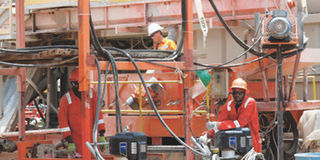Developing story: Iranian President Ebrahim Raisi confirmed dead in chopper crash
Kenya starts review of its oil and gas laws

PHOTO | STEPHEN MUDIARI Workers at an oil rig in Ngamia 1 in Turkana County earlier this year. A review of existing laws could see potential oil explorers pay Sh85 million ($1 million) in licence fees.
What you need to know:
- Speaking last week during an East Africa Energy and Gas summit in Nairobi, Energy minister Kiraitu Murungi said Kenya is moving to amend the Petroleum Exploration Production Act to align it with the present situation in the wake of oil and gas discoveries
- Some of the suggested amendments would see the National Oil Corporation (NOC) get 25 per cent interest in foreign firms operating locally
- Currently, there are two laws covering mining and the oil and gas sectors. The 35 per cent local shareholding is covered under the Mining Act (of minerals like gold and coal). A 25 per cent local shareholding structure is covered under the Petroleum Exploration and Production Act
A review of regulations in the oil and gas sector has left the government in a precarious position in its bid to attract investors.
Speaking last week during an East Africa Energy and Gas summit in Nairobi, Energy minister Kiraitu Murungi said Kenya is moving to amend the Petroleum Exploration Production Act to align it with the present situation in the wake of oil and gas discoveries.
Some of the suggested amendments would see the National Oil Corporation (NOC) get 25 per cent interest in foreign firms operating locally.
A seasoned industry analyst who did not wish to be quoted said this will not go down well in the industry.
The analyst said the government should involve relevant stakeholders to put in place proper regulations that can support the sector through fair revenue sharing agreements and just terms of reference for operators, the government, and local communities.
Currently, there are two laws covering mining and the oil and gas sectors. The 35 per cent local shareholding is covered under the Mining Act (of minerals like gold and coal). A 25 per cent local shareholding structure is covered under the Petroleum Exploration and Production Act.
The Ministry of Energy has also had run-ins with some oil explorers over the terms of operations with proposals, say, 35 per cent stake in foreign mining companies be allocated to local investors, while 25 per cent stake in foreign oil and gas companies operating in Kenya go to Nock.
Recently, Norwegian Oil exploration company, Statoil, quit, citing unreasonable terms of operations in Kenya.
“If local shareholders match that in terms of required funds, then I see no problem with it,” Tullow Oil Kenya chief executive officer Martin Mbogo said.
He said that even if it was on a 50-50 per cent basis and the local investor has the capacity to raise the funds to equal the shareholding, there is nothing wrong with that.
Analysts have, however, questioned the capacity of local shareholders in capitalisation to acquire stakes in foreign oil and gas companies operating here.
Recently, the minister blocked the transfer of shares valued at Sh3 billion by an unnamed oil exploration company to a third party until issues of fair revenue sharing are ironed out.
Given fairer terms
AfricaOil Corporation chief executive officer Keith Hill, however, said that oil and gas companies that came into the market much earlier should be given fairer terms compared to those that came in afterwards.
This is because of the huge initial risks associated with earlier uncertainties of whether the country had oil or gas deposits that could be commercially viable.
On the proposed reviews of the Petroleum Exploration Production Act, the commissioner for petroleum at the Energy Ministry, Mr Martin Heya, said the government has already received money from the World Bank to enlist the services of a consultant to help in the review of the Petroleum Act. The Act, put in place in 1986, has had no reviews since then.
“We shall talk to all stakeholders to get everything right from the start,” said Mr Heya.
The reviews will cover licensing procedures, revenue sharing agreements between oil companies, central and county governments, and the local communities.
Other provisions to be included are local content (developing local capacity to take up jobs in the oil companies, corporate social responsibility issues, prioritising tender awards to local communities in line with their capacity to deliver), environmental protection, and human rights issues.
Uganda, through the Public Finance Bill 2012 that is before its parliament, seeks to outline a framework for oil revenue management, royalty sharing mechanisms between local communities in oil producing zones, and the oil producers.
According Mr Murungi, oil wealth is to blame for abusing the environment, human rights, impoverishing communities, perpetuating conflicts, corrupting officials, as is the case in Nigeria’s oil producing Niger Delta.
“The current legal and regulatory framework governing the oil sector must be reviewed to incorporate fair revenue sharing agreements, protection of the environment, and safeguarding of human rights. In this regard, a special fund is also to be created to support and uplift the livelihoods of the communities in whose area the resources are found,” he said.
The reviews could also see oil prospecting and exploration companies pay up to Sh85 million ($1 million) in licence fees.
Companies with limited capacity to undertake prospecting and exploration of oil and gas would also be locked out from bidding and it would no longer be on a first-come-first-served basis, as has been the case.
This would see the introduction of tendering rounds by companies deemed to have the capacity to undertake the oil and gas exploration exercise.
“This will ensure that only companies with the capacity apply for bidding and not just any firm,” the minister noted.




